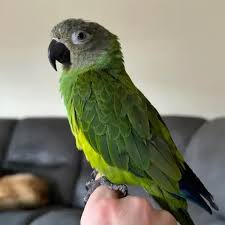A Comprehensive Guide to Conure Birds: Understanding the Charm of Black Cap Conures

Conure birds are among the most popular pet parrots due to their vibrant colors, lively personalities, and relative ease of care compared to larger parrot species. This comprehensive guide will delve into the world of conure birds, focusing specifically on the dusky headed conure, a captivating species known for its unique appearance and charming nature. Whether you are a seasoned bird enthusiast or considering adopting your first feathered friend, this article will provide you with valuable insights into the life, care, and quirks of these delightful avian companions.
Understanding Conure Birds: An Overview
What Are Conure Birds?
Conures belong to the parrot family and are native to Central and South America. They are small to medium-sized parrots, typically characterized by their bright plumage, playful behavior, and social nature. Conures are divided into several genera, including Aratinga, Pyrrhura, and Enicognathus, each containing species with distinct characteristics.
Popular Conure Species
Some popular conure species include:
- Sun Conure (Aratinga solstitialis): Known for their bright yellow and orange feathers and loud, boisterous calls.
- Green-Cheeked Conure (Pyrrhura molinae): A smaller conure with a more subdued color palette and quieter disposition.
- Jenday Conure (Aratinga jandaya): Similar in appearance to the Sun Conure but with more green on their wings and back.
- Black Cap Conure (Pyrrhura rupicola): The focus of this article, known for their distinctive black cap and green plumage.
The Black Cap Conure: A Unique Avian Companion
Physical Characteristics
The Black Cap Conure, also known as the Black-Capped Parakeet, is a small conure species native to the forests of South America, particularly in countries like Peru, Bolivia, and Brazil. They are characterized by:
- Size: Approximately 10 inches in length, making them one of the smaller conure species.
- Coloration: Their most distinctive feature is the black “cap” on their head, extending from the forehead to the back of the neck. Their body is primarily green with hints of blue on the wings and tail feathers.
- Beak and Eyes: They have a black beak and dark brown eyes that give them a sweet, expressive look.
Personality and Behavior
Black Cap Conures are known for their playful and inquisitive nature. They are highly intelligent birds that thrive on interaction and mental stimulation. Some key personality traits include:
- Social: They are very affectionate and enjoy being part of the family. They bond closely with their owners and are known to be quite cuddly.
- Curious: Like most parrots, Black Cap Conures are naturally curious and love exploring their environment.
- Vocal: While not as loud as some other conure species, they can still be quite vocal and enjoy mimicking sounds and learning new words.
Habitat and Natural Environment of the Black Cap Conure
Native Habitat
Black Cap Conures are native to the subtropical and tropical moist lowland forests of South America. They are often found in the Amazon Basin and are well-adapted to life in dense, forested environments. In the wild, they can be seen in flocks, foraging for fruits, seeds, and insects.
Conservation Status
Currently, the Black Cap Conure is not considered endangered, but habitat loss and the illegal pet trade pose threats to their population. Responsible pet ownership and awareness are crucial for their preservation.
Caring for a Black Cap Conure: Essential Tips
Housing Requirements
Proper housing is essential for the health and well-being of a Black Cap Conure. Consider the following when setting up their living space:
- Cage Size: A spacious cage with dimensions of at least 24″ x 24″ x 30″ is recommended. The bars should be spaced no more than 5/8″ apart to prevent injury.
- Perches and Toys: Provide a variety of perches of different textures and diameters to promote foot health. Toys are also essential for mental stimulation; opt for chewable toys, puzzle toys, and swings.
- Cleanliness: Maintain a clean environment by regularly changing the cage liner, cleaning perches, and ensuring fresh water and food are always available.
Diet and Nutrition
A balanced diet is crucial for the health of a Black Cap Conure. Their diet should consist of:
- Pellets: High-quality pelleted food should make up the bulk of their diet as it provides balanced nutrition.
- Fresh Fruits and Vegetables: Offer a variety of fresh produce such as apples, berries, carrots, and leafy greens daily. Avoid avocado, chocolate, and caffeine, as these are toxic to birds.
- Seeds and Nuts: These can be offered as treats but should not make up more than 10% of their diet due to their high-fat content.
Social Interaction and Mental Stimulation
Black Cap Conures are social creatures that require plenty of interaction and mental stimulation to stay happy and healthy:
- Daily Interaction: Spend at least a few hours each day interacting with your conure. This can include playtime, training sessions, or simply sitting with them while they perch on your shoulder.
- Training: These birds are highly trainable and can learn a variety of tricks and behaviors. Positive reinforcement techniques such as clicker training work well.
- Enrichment Activities: Rotate toys regularly and introduce new challenges, such as foraging toys or puzzles, to keep your bird engaged.
Common Health Issues in Black Cap Conures
Recognizing Signs of Illness
Black Cap Conures are generally hardy birds, but they are susceptible to certain health issues. Knowing the signs of illness can help you catch problems early:
- Lethargy: A normally active bird that becomes unusually quiet or inactive may be unwell.
- Changes in Appetite: Loss of appetite or sudden changes in eating habits can indicate a health problem.
- Respiratory Issues: Wheezing, coughing, or discharge from the nostrils may signal respiratory infections.
- Feather Picking: This behavior can be a sign of stress, boredom, or underlying health issues.
Preventative Care
Regular vet check-ups and proper care can help prevent many health issues:
- Routine Vet Visits: Schedule annual check-ups with an avian vet to monitor your bird’s health.
- Dietary Balance: Ensure your conure has a balanced diet to prevent nutritional deficiencies.
- Clean Environment: Maintain a clean living space to reduce the risk of infections and respiratory problems.
Breeding Black Cap Conures
Breeding Behavior
Breeding Black Cap Conures in captivity requires understanding their natural behaviors and needs:
- Breeding Age: They typically reach sexual maturity around 1-2 years of age.
- Nesting: Provide a suitable nesting box with nesting material such as shredded paper or wood shavings.
- Courtship: Mated pairs will engage in mutual preening, feeding, and other bonding behaviors before breeding.
Raising Chicks
Raising conure chicks requires careful attention:
- Incubation: The female usually lays 4-6 eggs, which she incubates for about 24 days.
- Feeding: Parents will feed the chicks, but breeders may need to supplement feeding if the parents are inexperienced or if there are too many chicks.
- Weaning: Chicks begin to wean at around 8-10 weeks old and should be introduced to a variety of foods during this time.
Choosing the Right Black Cap Conure for Your Home
Factors to Consider
Before adopting a Black Cap Conure, consider the following:
- Time Commitment: Conures require daily interaction and care. Make sure you have enough time to devote to their needs.
- Noise Level: While quieter than some conures, they can still be vocal, especially when bored or seeking attention.
- Space Requirements: Ensure you have enough space for a suitably sized cage and play area.
Finding a Reputable Breeder or Adoption Center
When choosing a Black Cap Conure, it’s important to find a reputable breeder or adoption center:
- Health Checks: Make sure the bird has been health-checked and has a clean bill of health.
- Socialization: A well-socialized bird will adapt more easily to your home and be more friendly and trusting.
- Adoption Option: Consider adopting from a bird rescue organization. Many conures need new homes, and adoption can be a rewarding option.
The Joys of Owning a Black Cap Conure
Building a Bond
Building a strong bond with your Black Cap Conure can be a deeply rewarding experience. These birds are affectionate and enjoy spending time with their human companions. Regular interaction and positive reinforcement will help strengthen your relationship.
Lifespan and Long-Term Commitment
Black Cap Conures have a lifespan of 20-30 years, making them a long-term commitment. It’s important to be prepared for the responsibility of caring for your bird for many years.
Enriching Your Life
Owning a Black Cap Conure can be incredibly enriching. Their playful nature, intelligence, and vibrant personality bring joy and companionship to any household. Whether you’re training them to perform tricks, watching them explore new toys, or simply enjoying their company, these birds make wonderful pets.
Conclusion
, especially the charming Black Cap Conure, offer a unique blend of beauty, intelligence, and affectionate behavior that makes them ideal companions for bird enthusiasts. With proper care, attention, and a loving home, these delightful birds can thrive and provide years of joy and companionship. If you’re considering adding a Black Cap Conure to your family, be prepared for a rewarding experience filled with playful antics, meaningful interactions, and a lifetime of avian friendship.


